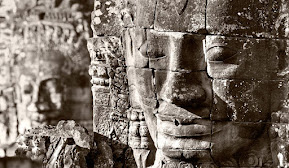TRACING THE ROOTS.
"Manuscripts after manuscripts, stories after stories, artefacts after artefacts, temples after temples. So long is the chain of ancient wisdom, each linked with the other. But if we trace back this chain, where will it take us? Back to the roots or to more confusing metaphors and darkness?
The original picture of ancient wisdom and ancient life must be entirely different than what we now imagine it to be because the ancient temples all around the world that stand lifelessly before us today have lost their prime meaning and purpose. The great important monuments are today just spots for tourist visits.
We certainly have no clue what life was like in those days, especially during the era when religious consciousness was at its peak, roughly 7000 years ago or even before. Those were the days in which people had a deeper spiritual and psychic connection to the universe. We certainly cannot imagine the state of mind that people had in those days.
We can definitely picture what life could have been like through the paintings, statues, art, and literature they left behind, but these cannot be regarded as solid proof. The statues are silent, the paintings are frozen moments in time, and literature is nothing but mere words. Words that are given life by our own imagination.
Now, if we rely solely on literature alone, then literature is nothing but a vast collection of written records preserved through time. Although the definitions of words are fixed, their meanings change slightly from generation to generation due to political or religious disputes and many other factors. More than that, the feelings associated with words also change. So what we have now is a jumbled and mixed-up puzzle of words through which we can visualize what life and philosophy were like in ancient days.
The tool of vision, which is literature, is itself flawed. This is the challenge before us: to create an accurate picture from these faulty broken pieces.
Now, why is it so important to study ancient literature? Because it is a framework of knowledge that has survived for more than 2000 years, it must hold some foundational truths. What was the strong feeling that was responsible for preserving this literature for such a long time?
Do the stories of creation, souls, gods, goddesses, astrology, fate, destiny, life and afterlife, karma, samsara, etc., point to something important? Do they address questions that each and every one of us asks ourselves at some point in life?
If these questions are intriguing, is it not worth seeking answers hidden within the layers of so-called 'religion'?
If you were given the task to decode the true meaning of our ancient literature, what would be your approach?
Please leave suggestions in the comments or email them to akash9422@gmail.com."

.webp)




Sabse pehley 4 line mai se the kaat
ReplyDelete